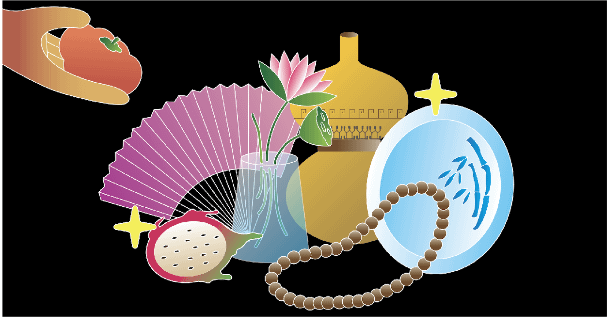Art Credit: N.J. Yuchu
What does the term AAPI or AANHPI stand for?
Rhode Island's First Month-long Celebration
The term AAPI stands for Asian Americans and Pacific Islanders. The term Asian American was first used by graduate students Emma Gee and Yuji Ichioka at UC Berkeley in 1968 to increase the visibility of activists of Asian descent and to combat the derogatory term “oriental” that was broadly used on people of Asian descent. The term Pacific Islanders refer to people who descended from the islands of Polynesia, Micronesia, and Melanesia. This term also includes people from Native Hawaii, Samoa, Tahiti, Guam, Fiji, and Papua New Guinea.
The term Asia in “Asian Americans” can be further divided into different regions of Asia, such as East Asia (China, Japan, Korea, Macau, Hong Kong, Taiwan), Southeast Asia (Philippines, Cambodia, Vietnam, Laos, Indonesia, Thailand, Singapore), and South Asia (India, Bangladesh, Sri Lanka, Nepal, Pakistan).
Sometimes you may also see the term as AANHPI, where NH stands for Native Hawaiians. In fact, the term Pacific Islanders already covers Hawaii. Therefore, when you see NH added to the term AAPI, it’s just an emphasis on Native Hawaiian. In short, in this brochure and all our communication materials, we use “AAPI”. The shorter the acronym, the easier it is to remember. We want our readers to remember the term easily.
Why was AAPI Heritage Month celebrated in May? What is the history of this celebration?
The history of the AAPI Heritage celebration was first thought of by former congressional staffer Jeanie Jew. She approached Rep. Frank Horton about designating a month to recognize Asian Pacific Americans after the United States celebrated its bicentennial celebration in 1976. After less than a year, Representatives Frank Horton and Norman Y. Mineta introduced a resolution in the U.S. House of Representatives to proclaim the first 10 days of May as Asian Pacific Heritage Week. A month later, Senators Daniel Inouye and Spark Matsunaga introduced a similar bill. President Jimmy Carter signed a joint resolution for the celebration on Oct. 5, 1978. Then in 1990, George H.W. Bush signed a bill passed by Congress to extend this celebration to a month. On May 14, 1991, a public law was passed unanimously by Congress and then signed by Bush, proclaiming May 1991 and May 1992 as the Asian and Pacific Islanders Heritage Month, where it became a national celebration throughout the coastal states where it has a concentration of Asian American population. Most notably, the concentrations in these coastal states are Los Angeles, San Francisco, and New York City. Soon it spread to other states, such as New Jersey, Texas, Massachusetts, Maryland, Georgia, and more.
Rhode Island’s first month-long AAPI celebration!
This is the first time in history that Rhode Island has had this month-long celebration recognizing the AAPI Heritage Month in this state. Cultural Society came up with the theme, Uniting AAPI Community for Change for the public art. Later, CSEBRI realized the education of AAPI culture and history cannot be done with just public art, so it envisioned a museum of AAPI history with a cultural center. And much later, learning about AAPI history cannot stop instantly the hate against the AAPI community, requiring a group of concerned citizens who work with the community at large, including the education sector and the state legislature to make the society an equitable and just place for the people of AAPI descent. That’s when the AAPI advisory council was formed. Read here to follow how these organizations sprung off of what we originally planned for a mural design.
From the theme of Uniting AAPI Community for Change Mural Art
to
A vision for a museum of AAPI History with a Community Center
to
AAPI Advisory Council
Sources:
https://sea.lib.niu.edu/burma/links
https://www.apsva.us/aapi-heritage-month-history/https://ncaatogether.org/about-us/defining-asian-american/
https://time.com/5837805/asian-american-history/
Please click on the button above to see the three-weekend celebrations and programming.
If you want to download the brochure, please click here.


